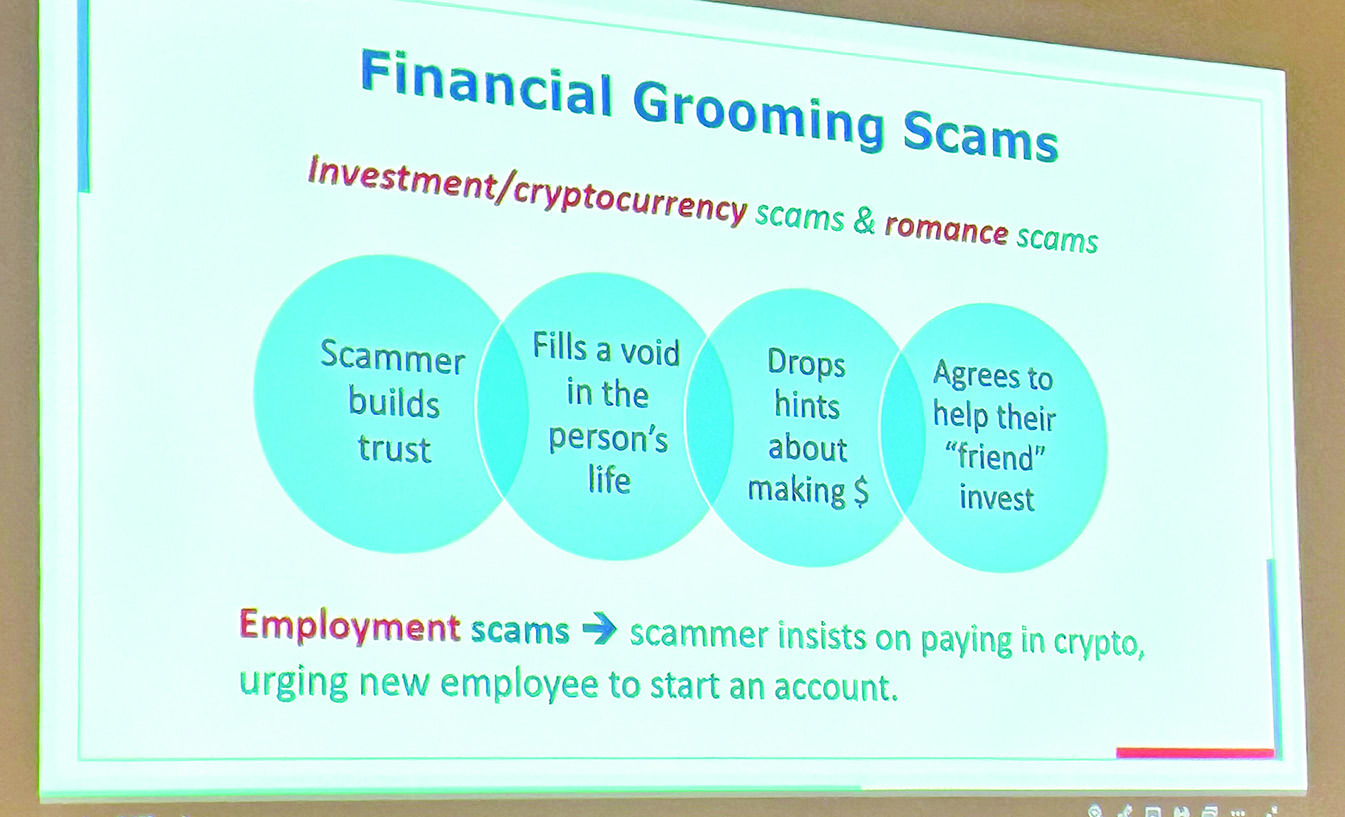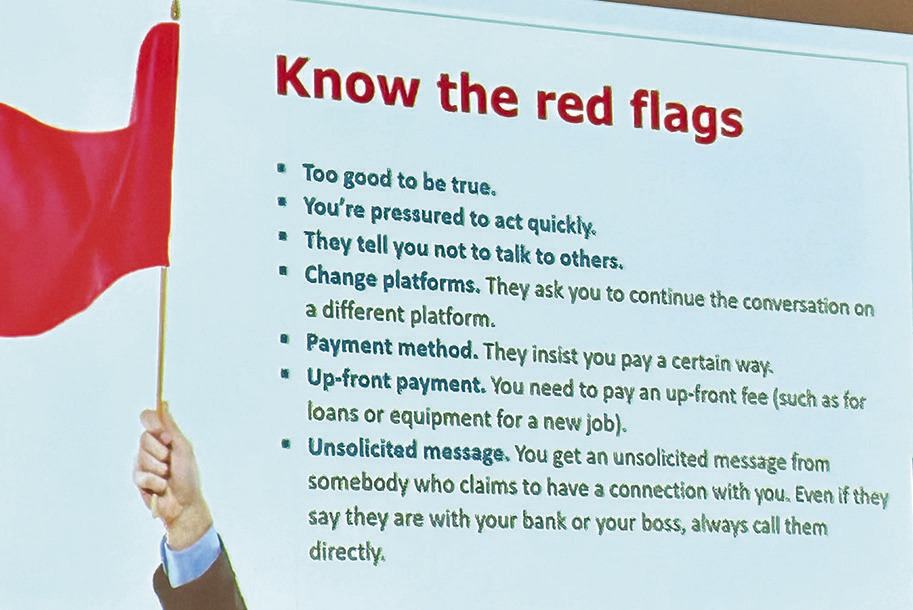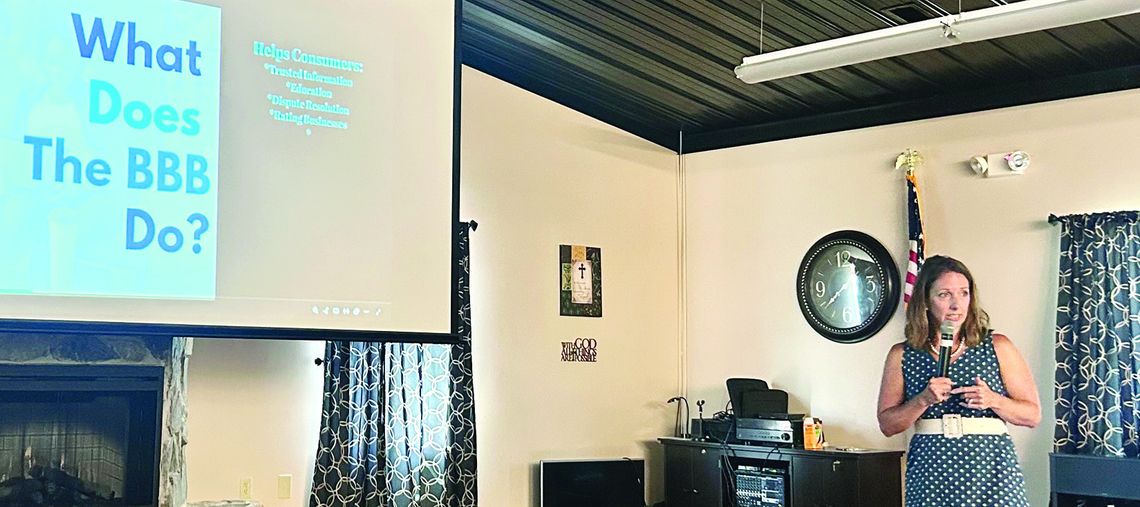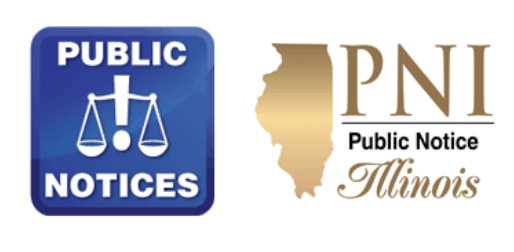'Call 800-888-1212 immediately. Your credit card has been compromised and we must confirm your information. Thank you.
Bank XYZ' What comes across as a text (or call) seems legit … and it appears urgent. Who doesn't want to stop criminals in their tracks from using your debit or credit card for thousands of dollars worth of purchases. But before you click on the link provided or call the number given, all of which seem real, pause and check it out.
That's the advice – among much more – that Jessica Tharp, CEO of the Central Illinois Better Business Bureau (BBB) gave over 50 attendees at Monday's 'Stop the Scam' seminar, which was presented at no cost, at Wesley Village. Tharp also presented a session to Wesley Village residents earlier on Monday.
According to Tharp, the top 10 riskiest scams that cost consumers millions in money and time, listed in order, included investment/ cryptocurrency; employment; romance/friendship; online purchases; home improvement; phishing/ social engineering; advanced fee loans; travel/ timeshare; government grants, and tech support.
'I got a text from what I thought was HP support, and when I called, the gentleman was pushing me to buy virus protection. I hung up and called HP and found out it wasn't real,' one participant shared during the Q & A.
Tharp shared numerous examples of scams that are circulating, and reiterated numerous times, if it sounds too good to be true, it probably is a scam. And anything that requires you to send a 'fee' in order to get a prize, a product or a job isn't legit.
'If you fall victim, please know you are not alone and the BBB is here to help you,' Tharp said. 'These are incredibly sophisticated criminals who study the market and know their audiences. They're incredibly good at what they do, which is why what you read or hear sounds so official.'

In 2024, older adults lost nearly $5 billion to scams and fraud, according to the FBI. Tharp said that among the top scams – romance/ friendship – often works because the person on the other end plays on someone's emotions, which can block logic and reasoning.
By pretending to be a friend or a potential romantic partner, the criminal can smooth talk their way into getting someone to give them money, a credit card and more.
'They chat with you frequently, build connections, build trust,' she explained. 'And eventually, when they've broken down barriers, they'll ask for money for a medical emergency or that they're stranded. The median loss for these types of scams last year was $6,099, up almost $3,000 from the year before.
It's heartbreaking when you find out this connection wasn't real.'
An interesting spin on the romance/friend scam over the last several months, is that the cybercriminal pretends to be a celebrity who's reaching out to be a friend.
Tom Hanks, Harrison Ford, Kelly Clarkson, Elon Musk and some other stars' names are used to befriend someone.
'I would love to be friends with Tom Hanks, but I know if I get a text or an email from 'Tom,' unsolicited, and he wants to be my friend, I know it's not him,' Tharp told the crowd. 'It's very hard to hear that these people are not really trying to be your friend. These criminals will often try to isolate someone from their family or friends, telling them to go somewhere at a certain time to call them so they can talk privately.
By doing this, family and friends are often unaware of what's happening.'
When in doubt of any offer – be it to fix your roof (whether you're seeking a roofer or one stops by unsolicited after a storm, for example) or you've 'won' a prize since as a car and cash from Publisher's Clearinghouse that you did NOT sign up for – head to the BBB site (see resources in sidebar) and check the Scam Tracker available.
Also, search other legitimate sources, such as a company's actual website.
According to a BBB article, 85 percent of money lost in sweepstakes, lottery and prize scams is from consumers over 65, with this age group losing $2.5 million of the $3.1 million in losses reported to Scam Tracker. Legitimate lottery or sweepstakes will never ask its winners to wire money or buy gift cards to claim the prize. A man in Branson, MO, told the BBB he received a call informing him he had won a $8.5 million Mega Millions prize and a Mercedes-Benz car.
He was told $85,000 in taxes had already been paid on the winnings, but he would need to pay $500 in lawyer fees to receive the prizes. After that, he received a call from someone claiming to be with Publisher's Clearinghouse, and the scam calls just kept coming.
And if you get a call from what you think is your credit card company, your bank or even your child or grandchild who claims they're in trouble and need money, hang up and call your bank/credit card company directly, or your loved one who is claiming to be 'in trouble.' As for texts, the best response, she said, is no response as to not confirm your phone number.
'The communications we get can be so alarming and confusing, which is the intent. They want to catch us off guard,' Tharp pointed out. 'As technology, and AI, evolves, these scams will get even more sophisticated. AI is definitely working for the scammers.
'But what I love about our organization (the BBB) is that we are the voice of reason and we're here to help you every step of the way,' she added. 'We have networks throughout North America, so if you encounter a business that has scammed you, such as a home improvement company, report it to the BBB.
We cross share information so if they skip town and try to set up shop in another community or state, we have that information. Check a company's status with the BBB before doing business with them. If they're accredited through us, then you have peace of mind.'
One way to check the legitimacy of an organization is when searching on Google, for example, place BBB after the name of the company, such as Home Roofer Company BBB.
If the company has complaints, rating and more, the BBB-related page for that organization will be included in the search, she said.
'Also look at a company's reviews on their website.
If it's nothing but positive reviews, give it an eyebrow raise and do more homework as scam companies will use bots and other measures to build trust with fake positive reviews,' Tharp added. 'Falling victim to a scam can be frightening and embarrassing, and cause weeks of headaches. Please know that we're here for you. The BBB has resources and people to help you navigate a scam. We'll dive in for you – that's what we're here for.'










